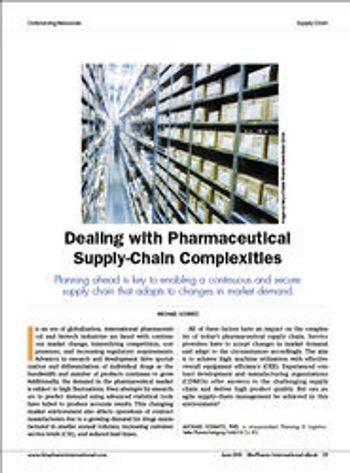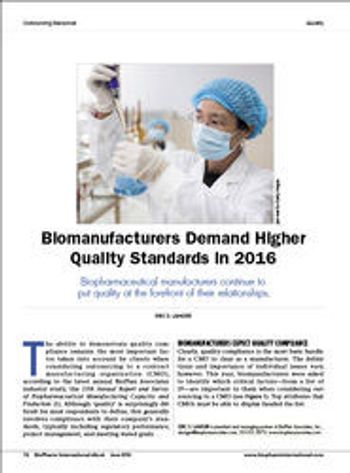
MilliporeSigma and the International Vaccine Institute in Seoul, South Korea aim to develop more robust, scalable vaccine manufacturing processes.

MilliporeSigma and the International Vaccine Institute in Seoul, South Korea aim to develop more robust, scalable vaccine manufacturing processes.

Studying broadly neutralizing antibodies in infants may lead to new pathways in HIV vaccine development.

The agency cited the company for sterile manufacturing violations.

A research team associated with Dr. Carl June announces it has discovered a way to engineer a patient’s own immune cells to recognize cancer-specific glycoantigens on tumor cells.

The first-ever use of CRISPR in humans will be evaluated by the National Institutes of Health during a meeting from June 21–22, 2016.

A new indication for Emergent BioSolutions’ BioThrax will give the drug market exclusivity through November 2022.

Pfizer broke ground at its Andover, Massachusetts campus on a clinical manufacturing facility for complex biologics and vaccines.

A study published in BMJ indicates that rheumatic patients with anti-infliximab antibodies may have a similar cross reaction to infliximab biosimilars.

Planning ahead is key to enabling a continuous and secure supply chain that adapts to changes in market demand.

Biopharmaceutical manufacturers continue to put quality at the forefront of their relationships.

In Phase III clinical trials, ixekizumab showed to be superior to etanercept and placebo in treating moderate-to-severe plaque psoriasis.

Results of a Phase II clinical trial reveal that stem-cell transplantation treatment following complete immune system destruction increases the duration of long-term remission in patients with multiple sclerosis.

Alvotech prepares for commercial biosimilar production in new facility with single-use bioreactors in Reykjavik, Iceland.

Brammer Bio establishes late-phase development and commercial manufacturing facility for advanced cell and gene therapies in Lexington, MA.

The vaccine alternative, manufactured with a GE FlexFactory system, could be associated with fewer adverse reactions than the live vaccine option

The wearable devices for the delivery of biologic products are now being manufactured and will be tested in clinical trials in the near future, according to the company.

A new 20,000-L microbial biologics facility in Ireland will be operational by 2018 for Fujifilm Diosynth's contract development and manufacturing customers.

The collaboration will provide GMP manufacturing ahead of future clinical studies.

New research presented at the American Society of Clinical Oncology meeting demonstrates that atezolizumab could be a promising first-line therapy for the treatment of bladder cancer in cisplatin-ineligible patients.

A naturally occurring CRISPR (clustered regularly interspaced short palindromic repeats) system that specifically can be used to modify the RNA of an organism is the newest development in the technology’s evolution. A new study, published on June 2, 2016 in Science, identifies C2c2, a bacterial protein that can be used as a tool to cleave single-stranded RNA sequences at desired locations.

Scale-up of complex, innovative products requires commercialization models that are sustainable.

An understanding of continuous process validation can lead the way to consistent approaches, reduced investigation times and observations, the avoidance of lost batches, and high-quality products.

Barriers to the production of biopharmaceuticals in moss are explored.

Advances in single-use systems, consumables, and continuous manufacturing show steady progress.

Advances in cell line engineering, process optimization, and in-vitro glycosylation are making a difference.